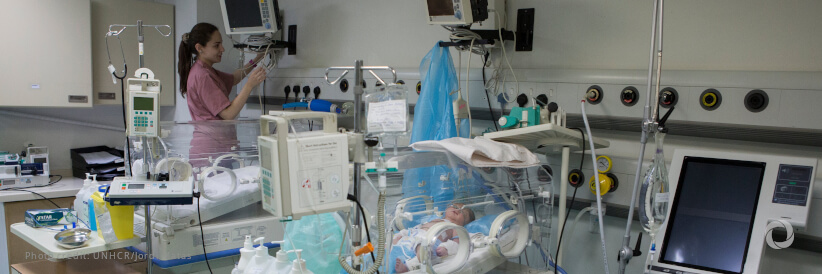The European Investment Bank (EIB Global) and the World Health Organization (WHO) have formally launched a €10 million grant to boost health resilience across Lebanon, including combating medicine scarcity and fragmented laboratory services.
The cooperation was signed at the EIB Forum in Luxembourg by WHO Director-General Dr Tedros Adhanom Ghebreyesus and EIB Vice President Thomas Östros and will support the re-establishment of the Central Public Health Laboratory in Lebanon, which is crucial for enhancing the detection capacity for emerging infectious diseases.
It will test for emergency infectious diseases, promptly confirming potential pathogens to prevent outbreaks, which will be especially relevant among vulnerable displaced populations and refugees. The CPHL will also test all blood donations to ensure safe transfusions.
The agreement will also unlock the provision of essential medicines and expert support to primary healthcare centres across Lebanon. This will enable public healthcare centres to restore services, including reproductive health and prevention of gender-based violence, addressing specific gender gaps in services.
EIB Group President Nadia Calviño said, “Strategic partnerships and win-win solutions are more important than ever in these challenging times. This important European Union financing for Lebanon’s public health system is also the fruit of our good cooperation with our fellow multilateral institutions and the excellent partnership with the World Health Organisation, whose expertise on the ground is vital to deliver projects like this one.”
WHO Director-General, Dr Tedros said: “This initiative comes at a critical time for Lebanon and will make a real difference in strengthening Lebanon’s capacity to detect and respond rapidly to health emergencies and in expanding access to lifesaving medicines. It’s a perfect example of the impact that WHO, EIB and other multilateral development banks aim to have around the world through the Health Impact Investment Platform.”
“We are grateful for the EIB and WHO’s support for Lebanon’s health sector. This initiative will help us address critical needs, improve the quality of care, and build a more resilient health system for people living across Lebanon,” said Ambassador of Lebanon to Belgium and Luxembourg Fadi Hajali.
“This joint initiative by the European Investment Bank and implemented by WHO is a crucial step towards strengthening Lebanon’s health system and ensuring that vital services reach the most vulnerable. By supporting the re-establishment of the central public health laboratory and bolstering primary healthcare centres, we are addressing immediate needs and building long-term resilience. This initiative is a prime example of the Team Europe approach, aligning with the European Union’s priorities in Lebanon and complementing our existing support for the health sector, particularly in ensuring access to essential medicines,” said Sandra De Waele, Ambassador of the European Union to Lebanon.
The grant is provided by the donor-financed EIB’s Economic Resilience Initiative (ERI) Fund, supported by EU member states. This project in Lebanon builds on previous projects co-managed by the WHO and the EIB in Palestine, Rwanda, and Angola. It paves the way for the operational launch of the Health Investment Platform- a unique financing approach that has seen several multilateral development banks, including the Islamic Development Bank and African Development Bank, join the EIB and WHO to provide a targeted and strategic approach to primary health care financing.
Lebanon’s health system is under significant strain due to a severe economic and financial collapse, compounded by multiple crises, including conflict in southern Lebanon, the Beirut port explosion, the Syrian conflict, and a cholera epidemic. Humanitarian challenges continue to escalate, making the population increasingly vulnerable.
The initiative will prioritise medication provision and healthcare support, including supporting over 50,000 people with chronic diseases like diabetes, cardiovascular issues, and cancer. Vulnerable populations, including those affected by the current conflict, Syrian refugees, and others will benefit from this initiative. Lebanon hosts approximately 1.5 million Syrian refugees and around 200,000 Palestinian refugees, constituting about one-third of the total Lebanese population. In addition, in 2025, the number of displaced people within Lebanon rose to over 950,000.
The initiative will be implemented by the World Health Organization and is fully endorsed by the Lebanese Ministry of Public Health. The initiative will contribute to the Ministry of Public Health’s strategy to strengthen the health services among vulnerable populations, including those affected by the current conflict.

